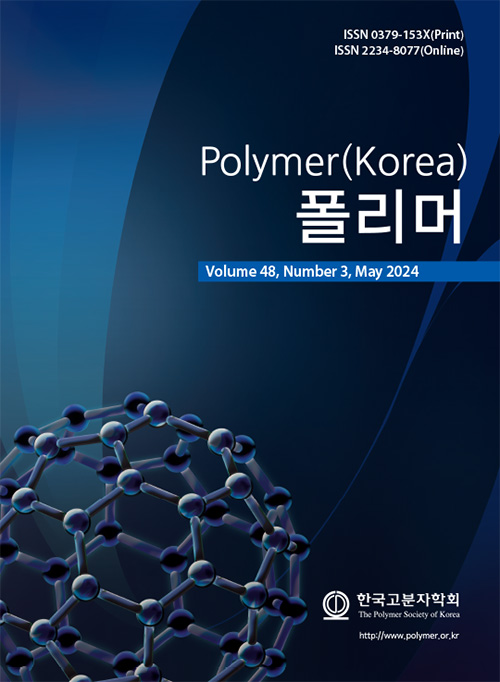- Study of Mechanical Properties and Radiopacity of PVA/CNC/BaSO4 Scaffold for Tissue Regeneration
Department of Advenced Organic Materials Engineering, Graduate School, Yeungnam University, Gyeongsan 38541, Korea
*School of Chemical Engineering, Yeungnam University, Gyeongsan 38541, Korea- PVA/CNC/BaSO4 조직 재생용 지지체의 기계적 물성과 방사선 불투과성 연구
영남대학교 대학원 유기신소재공학과, *영남대학교 화학공학부
Reproduction, stored in a retrieval system, or transmitted in any form of any part of this publication is permitted only by written permission from the Polymer Society of Korea.
PVA/CNC/BaSO4 scaffolds for tissue regeneration were manufactured via a freeze-drying method. The BaSO4 was mixed to make radiopaque scaffolds. The effect of BaSO4 on the compressive strength and radiopacity was investigated. The CNC was added to increase a compressive stress of the scaffolds. The presence of BaSO4 in PVA/CNC/BaSO4 scaffold was revealed by a wide angle X-ray scattering and SEM-EDX. Compressive strength of the scaffold increased by approximately 20% with the help of CNC and little change with respect to BaSO4 content was observed. Radiopacity was achieved by adding BaSO4 of 5 wt%, revealed by X-ray imaging. MTT assay test confirmed the biocompatibility of PVA/CNC/BaSO4 scaffolds.
PVA/CNC/BaSO4 조직 재생용 지지체를 동결건조법을 통해 제조하였으며, CNC 첨가로 인한 강도 향상 연구 및 BaSO4 첨가로 인한 방사선불투과성을 가져 조직 내 이식시 재료의 식별성 향상 연구를 진행한 결과, CNC 첨가로 인한 지지체의 강도는 약 20% 가량 높아졌으며, X-ray 촬영을 통해 BaSO4 5 wt% 첨가시 방사선불투과성을 가져 지지체의 뚜렷한 식별이 가능하였다. 또한, MTT 측정 결과, 실험기간동안 지지체의 세포 독성은 없는 것을 통해 생체적합성을 가지는 것을 확인하였다.
Keywords: polyvinyl alcohol, cellulose-nanocrystal, barium sulfate, scaffold, compressive strength, radiopacity.
- Polymer(Korea) 폴리머
- Frequency : Bimonthly(odd)
ISSN 0379-153X(Print)
ISSN 2234-8077(Online)
Abbr. Polym. Korea - 2023 Impact Factor : 0.4
- Indexed in SCIE
 This Article
This Article
-
2024; 48(3): 326-332
Published online May 25, 2024
- 10.7317/pk.2024.48.3.326
- Received on Jan 3, 2024
- Revised on Feb 14, 2024
- Accepted on Mar 21, 2024
 Correspondence to
Correspondence to
- Tae-Hwan Oh
-
School of Chemical Engineering, Yeungnam University, Gyeongsan 38541, Korea
- E-mail: taehwanoh@ynu.ac.kr









 Copyright(c) The Polymer Society of Korea. All right reserved.
Copyright(c) The Polymer Society of Korea. All right reserved.